In-Depth TrashBlitz Study: What does Your Plastic Waste say about Belize?
A newly released report from the environmental group Sea of Life sheds light on the growing plastic pollution crisis in Belize. According to data gathered from schools across the nation, plastic waste is not only widespread but also alarmingly predominant in the environment.
The Sea of Life’s “More Pride Less Plastics” campaign, which focuses on tackling single-use plastics, used data from the 5 Gyres Institute’s TrashBlitz app to audit waste at 11 sites across five school districts. The findings are concerning. The report shows that about 75% of the trash collected was plastic, or a combination of plastic, metal, and paper. Among the culprits are bottled water and food wrappers from well-known brands.
“When we actually sort and lay out all of the waste and litter in bulk patterns, it’s startling to see and often prompts disgust from volunteers,” said Paulita Bennett-Martin, co-founder of Sea of Life. “The careful, deliberate, and consistent collection of data is key to truly understanding what the nation’s waste and litter burdens look like. TrashBlitz gives people pause, and the data analysis allows us to identify solution pathways.”
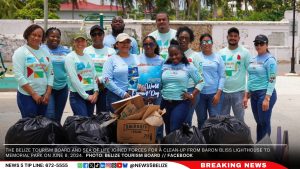
Crystal Bottled Water: A Symbol of Belize’s Plastic Problem
How many times today have you purchased a bottled water or ‘shilling wata’? One, two, or maybe none? Well, according to the report, the most common brand found in the waste was Crystal bottled water. It appeared more than any other brand across the country, showing just how much plastic water bottles are contributing to the pollution problem in Belize. Coca-Cola bottles were also widely found, coming in second place. These findings point to a major issue with single-use plastics in daily life.
“Crystal Water and Coca-Cola made up 36% of the identifiable brands study-wide,” the Sea of Life reported. Let’s take a moment to think of effective ways to cause a dent in this number. Well, if none came to mind, here’s one—water filling stations.
Back in September, water-refilling stations were installed at Wesley College. Since its installation, the data shows an impressive 85% reduction in plastic water pouch waste. Based on this report, it demonstrates the potential effectiveness of refillable alternatives in curbing plastic pollution.
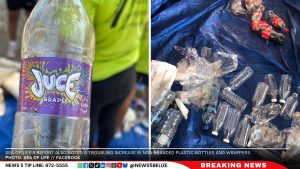
Data-Driven Approach: TrashBlitz Reveals the Size of the Problem
Sea of Life’s TrashBlitz campaign is an annual audit campaign that serves as both a data-gathering tool and an education platform. This time around, involved volunteers collected and logged data on plastic waste at 11 sites in Belize.
A total of 18,735 pieces of trash were recorded. Of that waste, around 75% was plastic or mixed with plastic materials. Beverage containers and food wrappers made up over half of the waste collected, while non-branded plastic bottles and wrappers were also commonly found.
“One important trend identified is the large percentage of high-sugar and fat snacks and beverages. When grouped together, chip, biscuit, ice cream, candy, punch, and soda brands made up 42% of all identifiable brands,” it reported.
Sea of Life’s report also noted a troubling increase in non-branded plastic bottles and wrappers, primarily used for fruit-flavoured drinks marketed as “natural juice,” despite their high sugar content. The organisation calls for greater transparency in labelling to promote more sustainable choices.
Belize, a nation with a population of 420,000, is heavily dependent on tourism and fisheries, sectors that are increasingly vulnerable to plastic waste. This data shows just how dependent Belize has become on single-use plastic. These plastics don’t just clog up public spaces—they end up in the environment, threaten wildlife, and pollute the nation’s waterways.
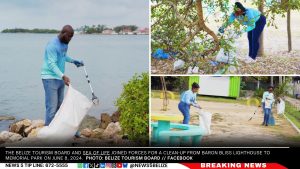
Community Science: Empowering Belizeans to Tackle Plastic Pollution
One of the standout features of the TrashBlitz initiative is its use of community science. More than 320 local stakeholders, including students, teachers, nonprofit workers, and community members, were trained to collect, sort, and log waste during the audits. This hands-on approach not only produces valuable data but also builds a sense of shared responsibility and stewardship for Belize’s environment.
Naomi Sylvania, a teacher at New Hope High School, said, “I have conducted 3 trash audits all in one year… Conducting clean-ups is okay, but let’s be realistic; this is not the solution.” She added, “Now is the time to make the policies for a better tomorrow before we consume plastic in larger amounts.”
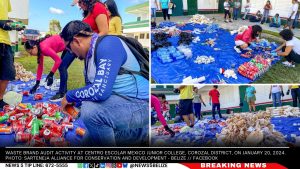
A Path to Sustainable Solutions
There is no clearer way for this report to say this: Belize’s plastic waste is a clear indication there needs to be changes in policies. The organisation urges policymakers to enact stronger legislation on plastic waste, including a nationwide ban on non-essential single-use plastics and the promotion of refillable water stations in public spaces.
The report exemplified the success seen at Wesley College, proving that refilling systems are not only effective in reducing plastic waste but also economically beneficial, saving families money and generating income for schools. “In less than six months of implementing refillable water on Wesley Campus, the decline in shilling wata litter was tremendous. Additionally, the water refilling stations will save parents over $300.00 a year per student,” it reported.
They suggest installing more refill stations in schools, offices, and tourist areas to help reduce the need for bottled water.
“Water refill stations on school campuses, in offices, and in high-traffic tourism hot spots offer a clear pathway to reducing the demand for and litter from single-use plastic bottles and pouches,” the organisation reported.
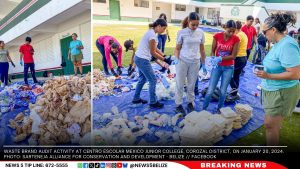
Another key recommendation is for Belize to implement bans on products like plastic bottles and food wrappers, similar to the Coca-Cola ban at Nazarene High School. The school’s decision to stop selling Coca-Cola products led to “the school recording 97.2% fewer Coca-Cola products than other schools across Belize.”
Sea of Life’s data and recommendations could be a turning point. But the responsibility to reduce plastic waste doesn’t fall solely on one group—it’s a shared effort from all Belizeans, from everyday citizens to businesses and government officials.





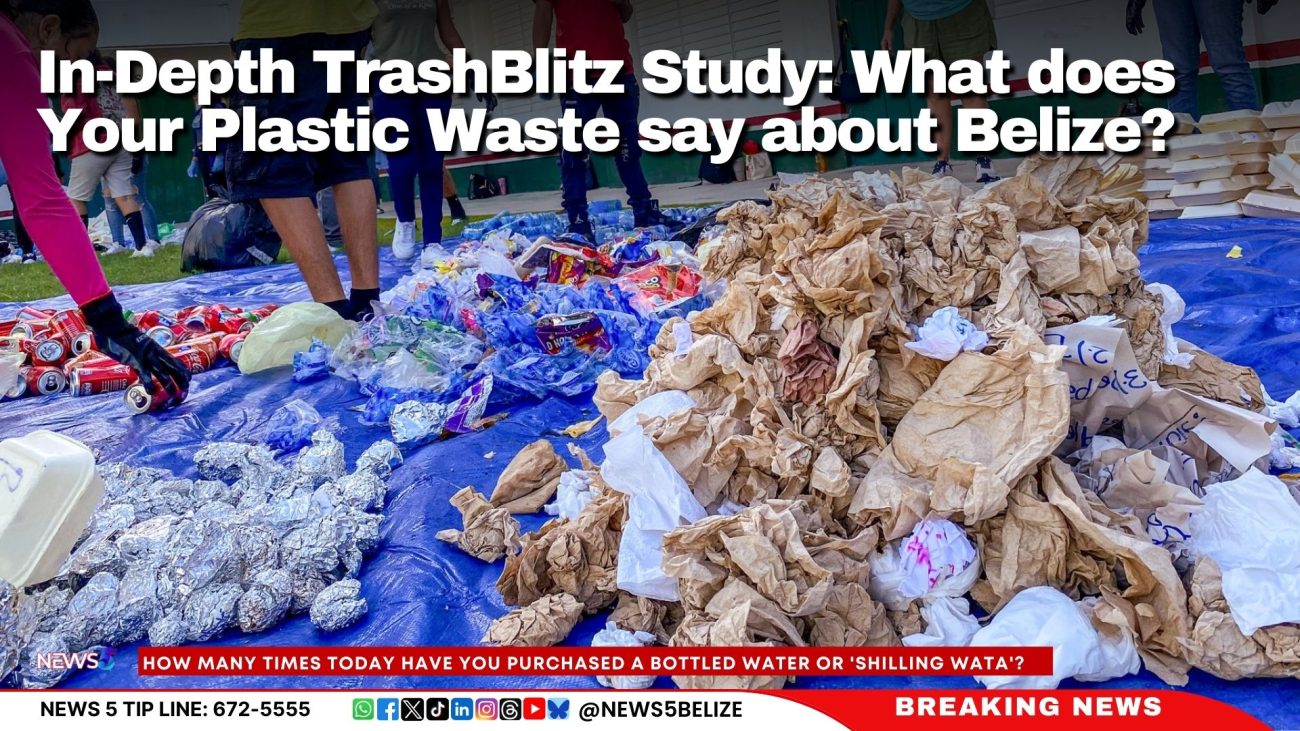

Facebook Comments